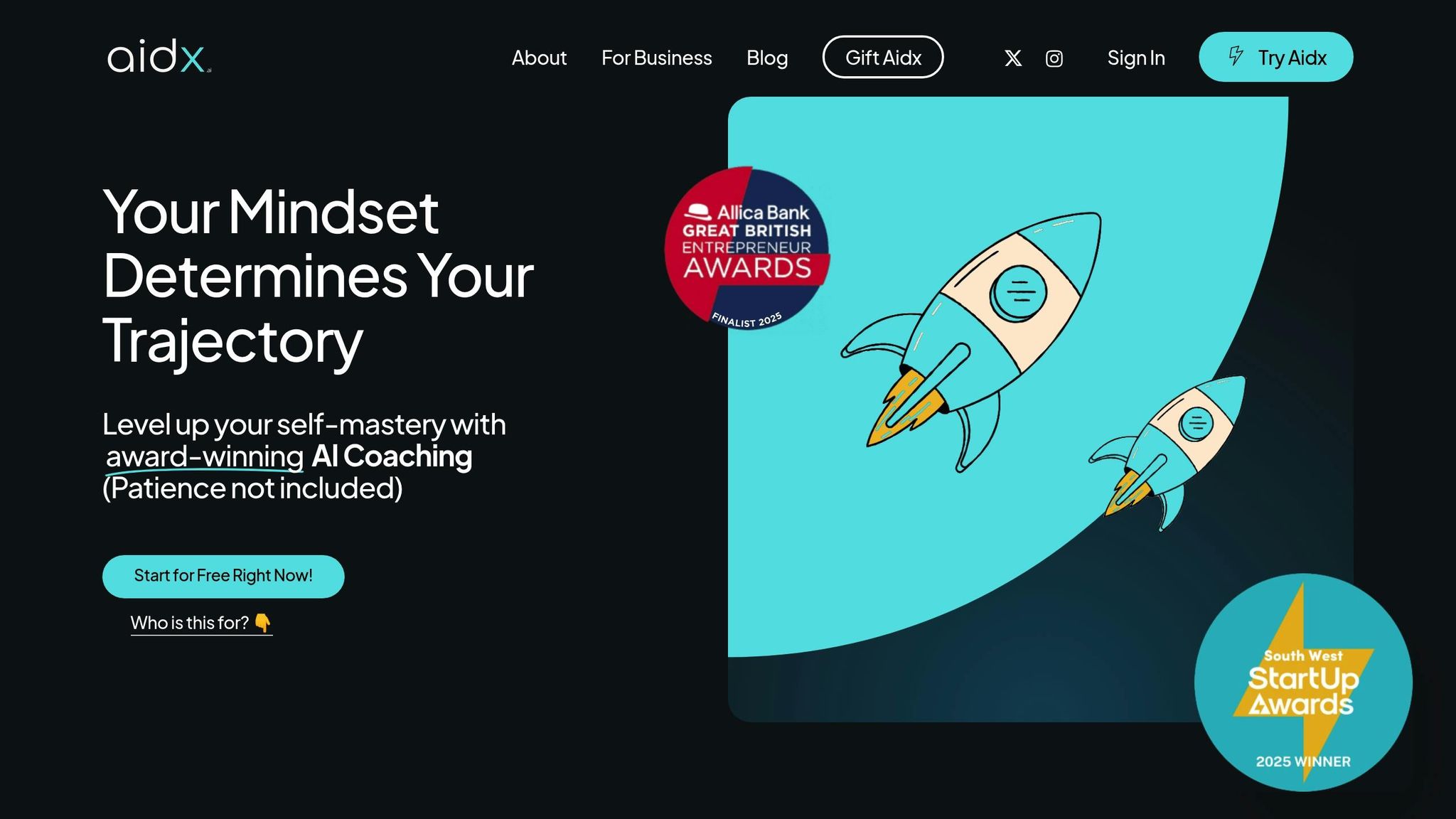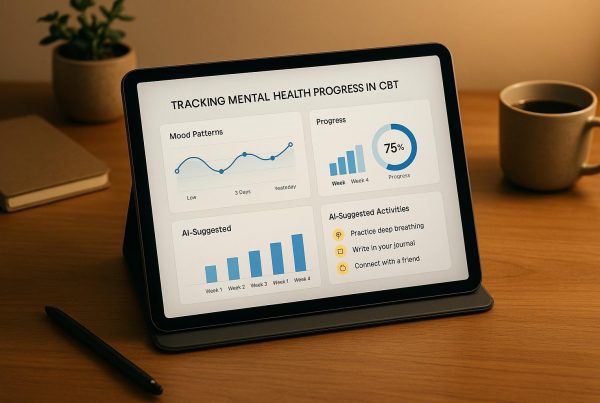Managing OCD can be costly and difficult to access, but AI therapy offers a low-cost, flexible alternative. Obsessive-Compulsive Disorder (OCD) affects 1.2% of U.S. adults, with treatments like Cognitive Behavioral Therapy (CBT) and Exposure and Response Prevention (ERP) costing $2,400–$7,200 over six months. Many face long wait times and limited access to therapists, especially in rural areas.
Enter AI therapy platforms like Aidx.ai, which provide evidence-based support for $21/month, reducing costs by 80–90%. Available 24/7, Aidx.ai uses advanced AI to deliver personalized care, including CBT and other proven methods, making it ideal for mild to moderate symptoms. While traditional therapy offers human interaction and tailored care for severe cases, Aidx.ai is a practical, affordable option for many.
For most, a hybrid approach – combining AI tools for daily support with occasional in-person therapy – can offer the best balance of affordability and effectiveness.
AI In Mental Health: Hope or Harm?
1. Aidx.ai

Aidx.ai is an award-winning AI therapist designed to deliver professional-grade mental health support directly to your device. Created by co-founders with over 30 years of combined expertise in therapy, coaching, AI engineering, and cybersecurity, this platform goes beyond basic chatbot functions to provide advanced, AI-driven assistance. Let’s break down the cost, accessibility, and features that make Aidx.ai a standout option.
Cost
Aidx.ai offers a subscription-based model that makes therapy more affordable compared to traditional options. Starting at just $21 per month, the subscription includes a 30-day refund policy and 30 free conversation turns, making it easy to explore the platform without commitment. For those seeking a more comprehensive experience, the Elevate Plan provides unlimited messaging, full access to therapeutic modes, voice chat functionality, and integrated planning tools.
Access
Therapy with Aidx.ai is available anytime, anywhere – no waiting for appointments or dealing with inconvenient schedules. Accessible via web and mobile, it eliminates the need for lengthy downloads. Whether it’s a late-night crisis, a quick moment during a lunch break, or while commuting, the platform ensures support is always within reach. Its voice-enabled interface allows for natural, hands-free conversations, making it especially helpful for individuals with OCD who may find verbal expression more comfortable.
Personalization
Aidx.ai’s Adaptive Therapeutic Intelligence (ATI) System™ is at the heart of its personalized approach. This system learns from each user’s unique communication style, emotional tendencies, and preferences to provide tailored responses. For those managing OCD, this means the AI can deliver targeted encouragement and techniques that align with their current challenges, offering support that feels uniquely relevant.
Evidence-Based Methods
Rooted in proven therapeutic practices, Aidx.ai integrates multiple evidence-based approaches to help manage OCD effectively. These include Cognitive Behavioral Therapy (CBT), Acceptance and Commitment Therapy (ACT), Dialectical Behavior Therapy (DBT), and Neuro-Linguistic Programming (NLP). These methods work together to address distorted thoughts, reduce anxiety, improve emotional regulation, and reframe negative thinking. Users can also set goals, track symptoms, and monitor progress using the platform’s built-in tools, ensuring a well-rounded therapeutic experience.
2. Traditional OCD Therapy
Traditional therapy for OCD, provided by licensed professionals, comes with challenges like high costs, limited accessibility, and the need for tailored care. While digital solutions like Aidx.ai offer a more accessible option, traditional therapy stands out for its direct human interaction and highly customized approach.
Cost
In the United States, therapy sessions with licensed professionals typically cost $100 to $300 per session, with weekly appointments often recommended for OCD treatment. Over six months, this can total $2,400 to $7,200 out of pocket[1]. On top of that, additional expenses such as transportation or childcare can add $20–$50 per session.
Insurance can help offset these expenses, but many plans have high deductibles, limited mental health coverage, or require cumbersome pre-authorization processes. Additionally, some specialized OCD therapists do not accept insurance, leaving patients responsible for the full cost. Even with insurance, copays and session limits can make long-term treatment financially burdensome.
Access
Finding a qualified OCD specialist can be a daunting task, especially given the shortage of mental health professionals across the U.S. In many areas, waitlists for therapy can stretch from weeks to months, with rural regions facing even greater challenges. Patients in these areas often have to travel long distances to access specialized care.
Urban centers typically offer more options, but even there, the demand for mental health services has surged, especially since the COVID-19 pandemic. Telehealth has become more common, but these sessions are often priced similarly to in-person visits and may not be offered by all providers. Despite these hurdles, traditional therapy remains a strong choice for its personalized and direct treatment approach.
Personalization
One of the key strengths of traditional therapy is its ability to deliver highly individualized care. Therapists design treatment plans based on detailed assessments, tailoring their approach to each patient’s unique symptoms, history, and preferences[1]. This flexibility allows adjustments to session frequency, therapeutic techniques, and even homework assignments based on a patient’s progress and feedback.
Progress is closely monitored through regular assessments, symptom tracking, and real-time feedback during sessions. Tools like the Yale-Brown Obsessive Compulsive Scale are often used to measure improvement and make data-driven adjustments to treatment plans[1]. This dynamic approach ensures therapy evolves to meet the patient’s changing needs.
Evidence-Based Methods
Traditional OCD therapy heavily relies on Cognitive Behavioral Therapy (CBT), particularly Exposure and Response Prevention (ERP), which is widely regarded as the gold standard for treating OCD[1]. Decades of research back these methods, with studies showing that patients undergoing CBT with ERP often see a 50 to 70% reduction in OCD symptoms after 12 to 20 sessions, with long-lasting benefits[1].
Therapists may also incorporate other approaches like Acceptance and Commitment Therapy (ACT) or recommend medication when appropriate. These well-researched techniques offer effective solutions, especially for individuals with severe or complex OCD symptoms, giving patients confidence in the treatment’s ability to deliver meaningful and lasting results[1].
sbb-itb-d5e73b4
Pros and Cons
When deciding between Aidx.ai and traditional OCD therapy, it’s important to weigh the differences to make the best choice for your needs. Here’s a breakdown of the key factors:
| Aspect | Aidx.ai | Traditional OCD Therapy |
|---|---|---|
| Cost | $16–22/month | $100–300 per session |
| Annual Investment | Around $192–264 | $2,400–7,200 for weekly sessions |
| Availability | Available 24/7 without appointments | Restricted to office hours; often involves waitlists |
| Hidden Costs | None beyond internet access | Additional expenses like $20–50 per session for transport or time off work |
| Privacy Options | Incognito mode with GDPR-compliant encryption | HIPAA-protected, though face-to-face disclosure is required |
| Personalization | Learns user patterns over time with the ATI System™ | Tailored care through therapist expertise during sessions |
| Crisis Support | Limited automated detection | Immediate human intervention when needed |
| Evidence-Based Methods | Includes techniques like CBT, ACT, DBT, and NLP | Offers a comprehensive range of therapeutic modalities |
| Suitable For | Mild to moderate symptoms and general wellness | All severity levels, including complex cases |
Aidx.ai’s Key Strengths
Aidx.ai stands out for its 24/7 availability and affordability, costing about 90% less than weekly traditional therapy. Its ATI System™ adapts to individual patterns, offering personalized support over time. Plus, privacy is a priority, with features like incognito mode ensuring safe and anonymous use.
Traditional Therapy’s Core Advantages
Traditional OCD therapy excels in providing personalized, human care through licensed professionals. Therapists can address complex cases, offer immediate crisis support, and adapt treatment plans based on nuanced needs. Despite its higher cost and limited accessibility, it remains a cornerstone for managing severe OCD and multifaceted mental health challenges.
Notable Limitations
Aidx.ai is best suited for mild to moderate symptoms and isn’t designed to handle severe or complex cases. On the other hand, traditional therapy, while indispensable for more serious conditions, often comes with challenges like long waitlists, high costs, and limited availability in many areas.
For many, a hybrid approach could be ideal: using Aidx.ai for daily skill-building and maintenance while relying on traditional therapy for deeper clinical support and oversight. This combination might offer the best of both worlds.
Conclusion
As we’ve explored, both approaches to OCD treatment have their own strengths. Aidx.ai stands out by providing round-the-clock therapy that’s both affordable and accessible. While traditional therapy can cost between $2,400 and $7,200 for six months, Aidx.ai offers an annual subscription ranging from $240 to $960 – potentially saving users up to 90%.
That said, Aidx.ai is best suited for those with mild to moderate symptoms. For severe OCD, professional intervention is still critical. Many users find a hybrid approach effective – using Aidx.ai for its 24/7 availability, voice-enabled interface, and evidence-based techniques like CBT, ACT, DBT, and NLP, while continuing with in-person therapy for more intensive guidance. This combination can reduce the need for frequent, costly in-person sessions while still maintaining professional oversight.
AI therapy also removes common barriers to care, such as high costs, geographic limitations, or scheduling conflicts. Tools like the ATI System™ personalize support by adapting to your communication style and emotional patterns, making therapy more tailored and effective.
Ultimately, the choice depends on your specific needs. If you’re managing mild to moderate symptoms or looking to supplement existing treatment, Aidx.ai offers an affordable and convenient option for daily support. However, for severe or complex cases, working with a licensed professional remains essential.
This evolution in care delivery allows individuals to seamlessly integrate on-demand, affordable support into their mental health journey.
FAQs
How does Aidx.ai protect my privacy and keep my data secure during therapy sessions?
Aidx.ai places a strong emphasis on protecting your privacy and securing your data through end-to-end encryption. This ensures that your information stays safe at all times. Additionally, the platform complies fully with GDPR regulations, adhering to top-tier data protection standards.
For those who want an extra layer of privacy, Aidx.ai provides an optional incognito mode. This feature guarantees that your sessions remain entirely private and confidential. Importantly, no human oversight occurs unless legally mandated, so you can feel confident that your information is treated with care and responsibility.
Is Aidx.ai suitable for managing severe OCD symptoms, or is it better for mild to moderate cases?
Aidx.ai offers support for individuals dealing with mild to moderate OCD symptoms by utilizing proven methods such as Cognitive Behavioral Therapy (CBT) and Acceptance and Commitment Therapy (ACT). However, it’s important to note that this tool is not a substitute for professional treatment in severe OCD cases or situations involving significant mental health risks. For those experiencing severe symptoms, seeking help from a licensed mental health professional is highly advised.
How does the Adaptive Therapeutic Intelligence (ATI) System™ personalize therapy for OCD?
The Adaptive Therapeutic Intelligence (ATI) System™ is designed to provide therapy that evolves with you. It learns how you communicate, recognizes your emotional tendencies, and understands your preferences. Over time, this system fine-tunes its approach to offer support that feels more personal and effective.
By incorporating proven methods such as Cognitive Behavioral Therapy (CBT), Acceptance and Commitment Therapy (ACT), and Dialectical Behavior Therapy (DBT), the ATI System™ ensures that the strategies it provides are practical and aligned with managing OCD. This thoughtful design aims to make therapy more relevant and deeply connected to your individual needs.



